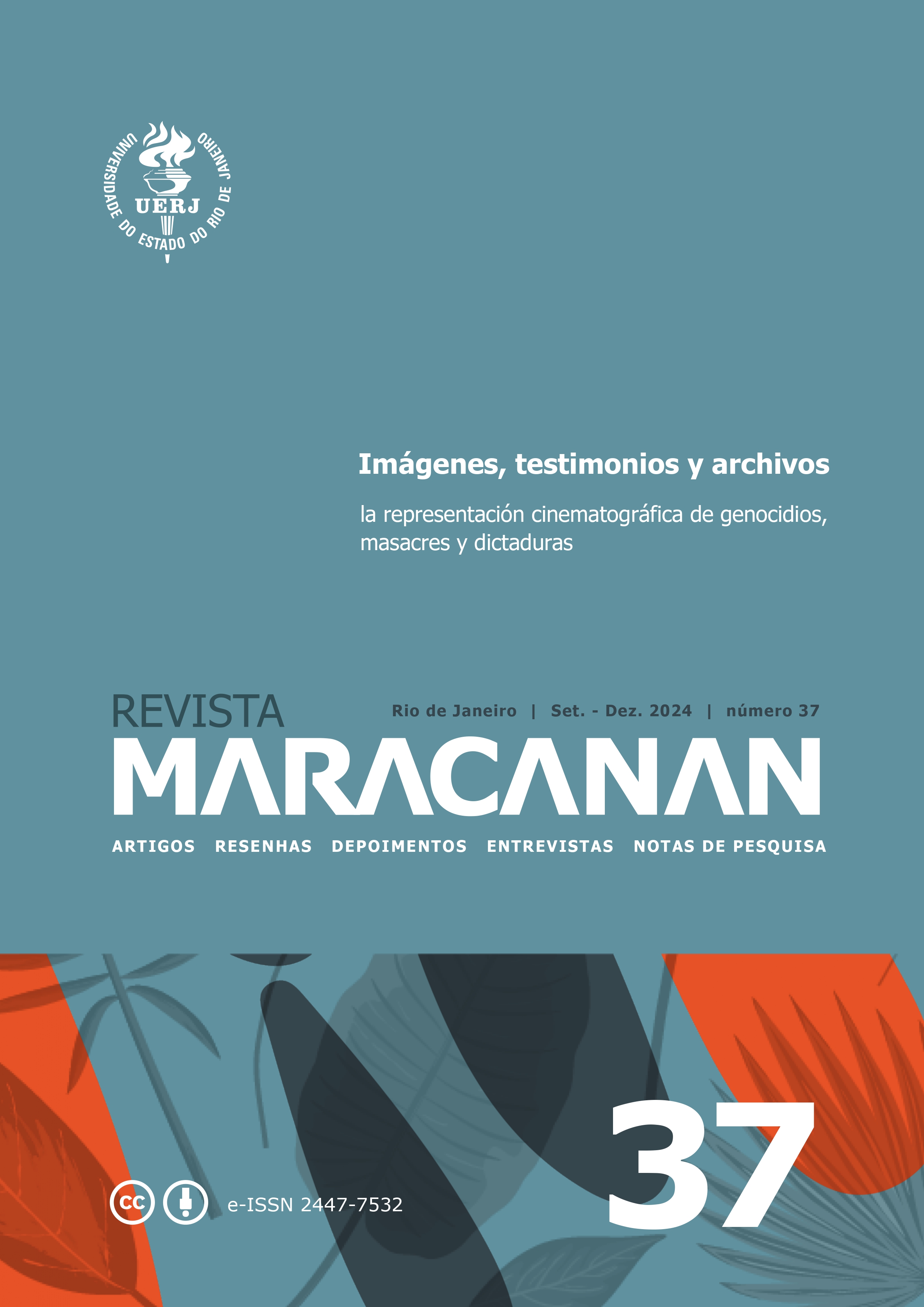“(Siento que) Sobreviví al Holocausto”
Testimonio y cine documental contemporáneo
DOI:
https://doi.org/10.12957/revmar.2024.84051Palavras-chave:
Genocidio, Testimonio, Holocausto, Cine Documental, ImposturaResumo
En el marco de una investigación sobre la representación del genocidio en el cine documental, este trabajo tiene como objetivo analizar tres documentales recientes sobre el Holocausto en el que falsos sobrevivientes son los protagonistas. Los tres casos, que en su momento generaron verdaderos escándalos, emergieron durante la llamada “era del testigo” y llevaron a poner en discusión las características y validez de los testimonios de los sobrevivientes del Holocausto. Los tres documentales que tomaré son Ich bin Enric Marco, W. What remains of the lie y Misha and the Wolves, que tratan sobre Enric Marco, Binjamin Wilkomirski y Misha Defonseca respectivamente. Llevando adelante una revisión comparativa de estas obras me propongo discutir las derivaciones que puede ocasionar cuando las propias características del documental son puestas en tensión para presentar a alguien que afirma una verdad que luego resulta una mentira. Se busca así analizar dos cuestiones: cómo han sido retratados y presentado los casos y los testimonios en cada documental y qué posibles consecuencias éticas y estéticas puede conllevar su “forma documental”.
Downloads
Referências
BALLÓ, Jordi; PÉREZ, Xavier Pérez. La semilla inmortal. Los argumentos universales en el cine. Barcelona: Anagrama, 1997.
CERCAS, Javier. El impostor. Buenos Aires: Random House, 2015.
CHABRIS, Christopher F.; SIMONS, Daniel J. El gorila invisible. Buenos Aires: Siglo XXI, 2011.
CORNER, John. Performing the Real. Documentary Diversions. Television & New Media, Ann Arbor, v. 3 n. 3, p. 255-69, 2002.
D’ANCONA, Matthew. Posverdad. La nueva guerra contra la verdad y cómo combartirla. Madrid: Alianza, 2019.
ESKIN, Blake. A Life in Pieces. The making and unmaking of Binjamin Wilkomirski. Nueva York: W. W. Norton. 2002.
FASSIN, Didier. La razón humanitaria. Buenos Aires: Prometeo, 2016.
FERRARIS, Maurizio. Posverdad y otros enigmas. Madrid: Alianza, 2019.
Fragments of a Fraud. The Guardian. (Site). Publicado en: 15 oct. 1999. Disponible en: https://www.theguardian.com/theguardian/1999/oct/15/features11.g24. Acceso en: 17 feb. 2024.
GAUDREAULT, André; JOST, François. El relato cinematográfico. Barcelona: Paidós, 1995.
GUDONIS, Marius. How Useful is the Concept of Post-Truth in Analysing Genocide Denial?: Analysis of Online Comments on the Jedwabne Massacre. Zoon Politikon, Varsovia, v. 8, p. 141-82, 2017.
HILBERG, Raul. Memorias de un historiador del Holocausto. Barcelona: Arpa, 2019.
HILBERG, Raul. Sources of Holocaust Research. Chicago: Ivan R. Dee, 2001.
HUYSSEN, Andreas. En busca del futuro perdido. Buenos Aires: FCE, 2001.
ILLOUZ, Eva. La vida emocional del populismo. Buenos Aires: Katz, 2023.
KAPLAN, E. Ann. Trauma Culture. New Brunswick: Rutgers University Press, 2005.
LACAPRA, Dominick. Escribir la historia, escribir el trauma. Buenos Aires: Nueva Visión, 2005.
LANGER, Lawrence L. Holocaust Testimonies. New Haven y Londres: Yale University Press, 1991.
LANGER, Lawrence L. Using and Abusing the Holocaust. Jewish Literature and Culture. Bloomington: Indiana University Press, 2006.
LAPLANCHE, Jean; PONTALIS, Jean-Bertrand. Diccionario de psicoanálisis. Buenos Aires: Paidós, 1996.
MAZZONI, Giuliana. ¿Se puede creer a un testigo? Madrid: Trotta, 2010.
MCMYLER, Benjamin. Testimony, trust, and authority. Nueva York: Oxford University Press, 2011.
NICHOLS, Bill. Cuestiones de ética y cine documental. Archivos de la Filmoteca, Valencia, n. 57, p. 27-45, 2007.
NICHOLS, Bill. Science, Fraud and Documentary. Bill Nichols. (Blog). Publicado en: 24 mar. 2016. Disponible en: https://billnichols.net/2016/03/24/science-fraud-and-documentary/. Acceso en: 17 feb. 2024.
NOVICK, Peter. The Holocaust in American Life. NuevaYork: Mariner Books, 2000.
PEREC, Georges. W o el recuerdo de la infancia. Barcelona: Península, 2003.
PLANTINGA, Carl. Caracterización y ética en el género documental. Archivos de la Filmoteca, Valencia, n. 57, p. 46-67, 2007.
SALECL, Renata. Why One Would Pretend to be a Victim of the Holocaust. Other Voices, Philadelphia, v. 2, n. 1, p. 1-4. 2000.
SHAPIN, Steven. Never pure. Baltimore: Johns Hopkins University Press, 2010.
SULEIMAN, Susan. Crises of Memory and the Second World War. Londres: Harvard University Press, 2006.
TOBIAS, Ronald B. El guión y la trama. Fundamentos de la escritura dramática audiovisual. Madrid: Ediciones Internacionales Universitarias, 1999.
TRAVERSO, Enzo. El fin de la modernidad judía. Historia de un giro conservador. Buenos Aires: FCE, 2014.
WALKER, Janet. Trauma Cinema. Documenting Incest and the Holocaust. Berkeley: University of California Press, 2005.
WEISSMAN, Gary. Fantasies of Witnessing. Postwar Efforts to Experience the Holocaust. Ithaca: Cornell University Press, 2004.
WIEVIORKA, Annette. The Era of Witness. Ithaca: Cornell University Press, 2006.
WILKOMIRSKI, Binjamin. Fragmentos. De una infancia en tiempos de guerra. Buenos Aires: Atlántida, 1997.
WINSTON, Brian. Ethics. In: ROSENTHAL, Alan; CORNER, John. New Challenges for Documentary. Manchester: Manchester University Press, 2005.
ZYLBERMAN, Lior. La confusión. El caso Demjanjuk y la representación del Holocausto. Journal Ética y Cine, v. 14, n. 3, nov.-fev. 2024.
Downloads
Publicado
Como Citar
Edição
Seção
Licença
Copyright (c) 2024 Lior Zylberman

Este trabalho está licenciado sob uma licença Creative Commons Attribution 4.0 International License.
Os autores mantêm os direitos autorais e concedem à Revista Maracanan o direito de publicação, sob uma Licença Creative Commons Atribuição 4.0 Internacional, a qual permite que outros distribuam, remixem, adaptem e criem a partir do seu trabalho, mesmo para fins comerciais, desde que lhe atribuam o devido crédito pela criação original.
Os dados e conceitos abordados são da exclusiva responsabilidade do autor.
A Revista Maracanan está licenciada com uma Licença Creative Commons Atribuição 4.0 Internacional.





